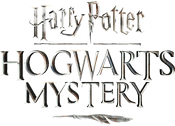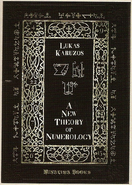
|
Warning!
At least some content in this article is derived from information featured in Harry Potter: Hogwarts Mystery. Spoilers will be present within the article. |
- "If being good at Divination means I have to pretend to see death omens in a lump of tea leaves, I'm not sure I'll be studying it much longer! That lesson was absolute rubbish compared with my Arithmancy class!"
- — Hermione Granger's opinion of the class[src]
Arithmancy is a magical discipline that studies the magical properties of numbers, including predicting the future with numbers and numerology.[1] Wizards and witches who study and practise Arithmancy are called Arithmancers.
Arithmancy is an elective subject offered from the third year on at Hogwarts School of Witchcraft and Wizardry, the homework assignments of which include writing essays that require the consultation and/or composition of complex numerical charts.[2]
History
Numerology and Grammatica,[3] a third year textbook at Hogwarts.
New Theory of Numerology, which Harry Potter gave to Hermione Granger for Christmas in 1995, due to her love and passion for this academic subject.[4]
Notable Arithmancers
| Wizard(s) | Notes |
|---|---|
| Bridget Wenlock | The archetypal example; she was a celebrated witch who first discovered the magical properties of the number seven in the 13th century.[5] |
| Septima Vector | Taught Arithmancy and Advanced Arithmancy Studies at Hogwarts School of Witchcraft and Wizardry for at least six years (possibly more). |
| Hermione Granger | Famous high-ranking official in the Department of Magical Law Enforcement, who strongly contributed to Voldemort's downfall as she accompanied Harry Potter in the hunt for Horcruxes; translated the Tales of Beedle the Bard into English from Runic. |
| Ben Copper | Achieved an O.W.L. in this subject at Hogwarts. |
| Percy Weasley | Achieved an O.W.L. in this subject at Hogwarts. |
| William Weasley | Achieved an O.W.L. in this subject and worked as a Curse-Breaker for Gringotts Wizarding Bank. |
| Curse-Breakers | An O.W.L. in Arithmancy is required to take the job. |
Arithmantic texts
Etymology
Arithmancer and Arithmancy come from the Greek αριθμός (arithmos), meaning "number", and μαντεία (manteia), meaning "divination". Hence "Arithmancy" literally means "number divination", which is fitting.
Behind the scenes
- In reality, the term "Arithmancy" refers to a supposed form of divination based on assigning numerical values to words or phrases; the term "Numerology", referred to in canon as a branch of Arithmancy, refers to any of a number of different beliefs in a divine or mystical relationship between a number and coinciding events.
- In film adaptation Harry Potter and the Prisoner of Azkaban, Hermione seems to choose Ancient Runes, not Arithmancy, as her favourite subject, comparing its superiority over Divination.
- In a broader sense, it would also seem like arithmancy have taken on the same role that mathematics has in the Muggle world, seen as how when Cerberus Langarm confiscates the accounts ledger from Slug & Jiggers Apothecary in Diagon Alley as evidence in an ongoing investigation in Fantastic Beasts: Cases from the Wizarding World, and delegates the task of going through it to Mathilda Grimblehawk and her partner, the former of which said: "Hah, if he thinks we'll be put off by this... really, really long book of boring financial figures... I know, I'm falling asleep just thinking about it! Better pass this on to an expert. Sage studied Arithmancy, right? He'll love this!" Furthermore, arithmancy was also used by curse-breakers because some banking and transaction came with the job. Also, in the Harry Potter and the Order of the Phoenix (video game), when the trio is looking for potion-ingredients for Snape and Hermione comments on how many samples of a plant they have collected and how many they have left, Ron will exclaim; "I know we're not taking arithmancy like you do, Hermione, but we know how to count to five."
- In Harry Potter and the Prisoner of Azkaban, Hermione expressed open contempt for the subject of Divination, yet has also proclaimed that Arithmancy (in which numerology is prominent) is her favourite subject. While this may seem contradictory at first, a likely explanation is that Arithmancy applies a more rigorous and mathematical approaches to predicting the future (which the scientifically-inclined Hermione would respond to), unlike Divination, which she detested because it seemed to be "a lot of guesswork." Indeed; while we are only given a limited insight into what this subject contains within the universe of Harry Potter, we are still provided with just enough information to make an educated guess. We know, for example, that it is about "predicting the future with numbers", that numbers have magical properties, (e.g. Voldemort's making seven horcruxes specifically because it is the most powerful magical number), and that it is required in order to become a curse-breaker.
- Hence, it would appear that the field of Arithmancy serves as a foil to the wooliness of Divination in that the ones practicing base their predictions on that which is already known. That is, if the inclusion of numerology is any indication, on the assumption that everything that exist have some numerological value associated with it and that you can predict the likely behaviour of the world around you by using arithmetical laws to combine those values and interpret the meaning of the result, it would seem like the subject of Arithmancy deals with, at least in part, the development of predictive models for estimating the probability of a given event taking place. If this is indeed the case, it is easy to see how this would be of value to curse-breakers: it allows them to evaluate the potential success of a curse-breaking strategy without having to actually do it by taking the numerology of a spell that they consider using, and the numerology of the curse they want to counter, and use arithmetical laws to analyse how the two interact; and thus greatly minimise the risk of failure and/or injury.
Appearances
- Harry Potter and the Philosopher's Stone (video game) (Mentioned on a Famous Wizard Card) (Bridget Wenlock)
- Harry Potter and the Chamber of Secrets (video game) (Mentioned on a Famous Wizard Card) (Bridget Wenlock)
- Harry Potter and the Prisoner of Azkaban (Mentioned only)
- Harry Potter and the Order of the Phoenix (Mentioned only)
- Harry Potter and the Order of the Phoenix (video game) (Mentioned only)
- Wizard of the Month (Mentioned only)
- Harry Potter: Hogwarts Mystery (Mentioned only)
Notes and references
- ↑ 2005 Royal Albert Hall interview with J. K. Rowling
- ↑ Harry Potter and the Prisoner of Azkaban, Chapter 12 (The Patronus)
- ↑ Harry Potter and the Prisoner of Azkaban, Chapter 16 (Professor Trelawney's Prediction)
- ↑ Harry Potter and the Order of the Phoenix, Chapter 23 (Christmas on the Closed Ward)
- ↑ Famous Wizard Card (Bridget Wenlock)
External links
| Arithmancy | ||
|---|---|---|
| Professors: Septima Vector | ||
| Known Arithmancers: Sage Bragnam · Lukas Karuzos · Chiara Lobosca's father · Bridget Wenlock | ||
| Textbooks: Numerology and Grammatica · New Theory of Numerology | ||
| Arithmancy at Hogwarts: Arithmancy (class) · Classroom 7A · Advanced Arithmancy Studies |


